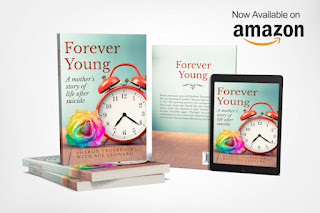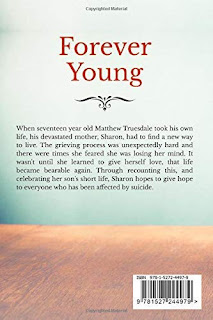Today we are interviewing Sharon Truesdale about her non-fiction book, titled “Forever Young A Mother's Story of Life after Suicide”
Tell us a bit about yourself.
I live in Northern Ireland. I work for the Education Authority for Northern Ireland in Education other than at School Program supporting young people with special educational needs. I have four children Matthew, Natasha, Annie Jean and Daniel and have been blessed with grandchildren; Tyler, Nancy Louise and another beautiful grandchild due in the next couple of weeks. I enjoy the simple things in life like walking the dogs on the beach, going to the movies and heading out for a meal.
Describe your book, “Forever Young A Mother's story of Life after suicide,” in a few sentences.
The book is my story of life after the suicide of my son Matthew aged 17. I have shared my most personal feelings, thoughts and behaviors with the hope that my story will help others and help break the stigma attached to mental health illness and suicide.
Who do you think would most benefit from reading this book?
I think it would help anyone who has a mental health illness, contemplated suicide, is a survivor of suicide, or affected by suicide or someone who is grieving by showing them that they are not alone and that there is support and services available out there. It would also help organizations and services understand the importance of following their policies and procedures and the consequence of what would happen when they do not. It can also help employers understand the impact of suicide or grief has on a person and also within their family when forming welfare at work policies. It can help each one of us to acknowledge the importance of talking and practicing self-care.
What inspired you to share your story?
I was inspired by others to share my story. Over social media I read about people painting stones with positive messages on them, placing them for others to find them. Notes with messages and helpline numbers attached to bridges to encourage people to seek help and that they are loved and valued. Benches placed around communities to encourage people to sit down and talk. The list goes on…
What are some ways that you worked through the grieving process?
I read books, attended a Bereaved by Suicide support group and worked with a counselor for 9 months, joined online grief support groups mainly on Facebook to try and understand what was happening to me. I visited my GP during times when I felt lost. I was looking for a quick fix however it took a long time to realize that this was a process and one which would require me to be true to myself by acknowledging my feelings, thoughts and behaviors. I learned mindfulness which I found helpful as it allowed me space to understand me in this new life I found myself. By practicing mindfulness I started to hear the birds sing again when I was out for a walk, to feel the wind on my skin and the rain on my cheeks and I started to enjoy the things I used to do, before the nightmare began. I started to stay more focused on the here and now rather than be reliving the past often stuck on the day I found Matthew. I learned to apply this into the simple things in life like watching a movie and as I practiced it I started to cope better.
What are some things you learned from the experience of working through the grieving processes?
The main thing I learned from my journey is the importance of showing myself love, kindness and forgiveness and practicing self-care. By listening and acknowledging my thoughts, behaviors and feelings I learned to be in control of my new life as the old Sharon Truesdale died when I found my son. By practicing self-care I learned to live more in the here and now instead of existing in the past.
Part of your grieving process has been celebrating your son’s life. Can you tell us a bit more about this process?
As a family we meet up with Matthews friends on his anniversary and on his birthday at his garden. We share stories, let go off balloons and spend time remembering Matthew. Over the years Matthews Facebook has become a memorial page and we share memories, photos and thoughts to Matthew and with each other. Matthews son Tyler who is 6 years old and Matthews brother Daniel, aged 8 as they get older they ask more about Matthew. We use these times to share stories and experiences to teach them about Matthew; going to the bakery to buy Matthews favorite sausage rolls and visiting Portrush where Matthew loved to sea fish.
For someone who has recently lost a loved one to a suicide, do you have any advice for them?
TALK, TALK, TALK to friends, family, anyone. You do not have to suffer in silence or be alone. There are services out there who can help. If you try one and you haven’t connected with it, try another. Find one that fits.
On a similar note, do you have any advice for someone who is trying to support someone affected by suicide during their grieving process?
Listen without judgement and without feeling the need to advise. Just be there. Instead of stating the obvious ‘you’ve lost weight’ help out by doing practical things like making them a sandwich. Remember as life goes on for you, they are often still at day 1, week 1. I found my son, organized the funeral and watched him be buried but I didn’t accept he died until 9 months later.
Did writing the book take you to unexpected places or reveal things you hadn’t thought about before?
When writing the book I reflected over my life as a whole journey from Matthews birth to his death and in between. Beforehand life was viewed in segments; when I was young, when I was at college, when I was married. During difficult life experiences these were often forgotten about through avoidance. The book highlighted my life as a whole and triggered a lot of good and bad experiences which I had to deal with.
Was it difficult to revisit these painful memories during the writing process?
Revisiting them brought me back to when I was married, Matthews time at school, the day I found my son and I had to relive each memory with the view of sharing them with people I do not know. I had to be honest and genuine when sharing my story so I had to go to places in my mind which I didn’t want to go to especially back to the darkest days when I too contemplated suicide. I was scared that my old feelings, thoughts and behaviors would impact all the positive things I was doing and return me back to the unhealthy ways of coping, for me which was alcohol and gambling.
What was the most challenging aspect of writing the book?
The most challenging aspect of writing the book was to make sure it was a fair and accurate account of what happened in my life without letting the feelings associated with grief to take over e.g. anger, guilt or shame especially when recounting parts of my life which involved others.
It seems mental health and suicide have been getting more attention by the public recently, especially with the loss of several celebrities, such as Anthony Bourdain, Kate Spade, and Avicii, among many others. Do you think this has helped people gain a deeper understanding of mental health and suicide?
It highlights that suicide can affect anyone; old, young, rich, poor, male, female and that we can all hide behind a mask. Numbers are increasing yet there is still a stigma attached to mental health and suicide. Celebrity families help break the stigma attached by talking openly about it and encouraging people to talk and seek help.
How have readers responded to your book so far?
I have received some lovely messages from readers who have lost a loved one through suicide, from as close as my hometown and as far away as California thanking me for sharing my story and how it has helped them feel that they are not alone. Other readers who have shared they have a mental health illness have thanked me and said that the book helped them. I hope the book simply encourages us to start talking to each other and look for support and services if and when we need further help.
More Information
Buy the book on Amazon.


No comments:
Post a Comment